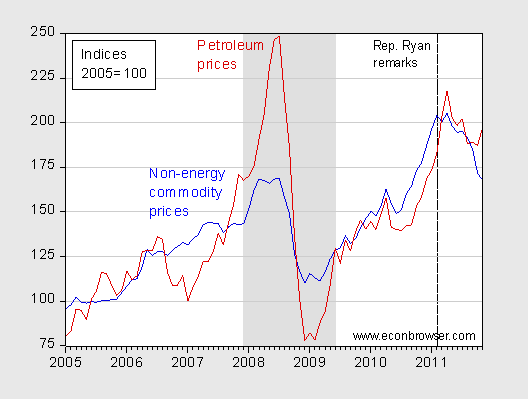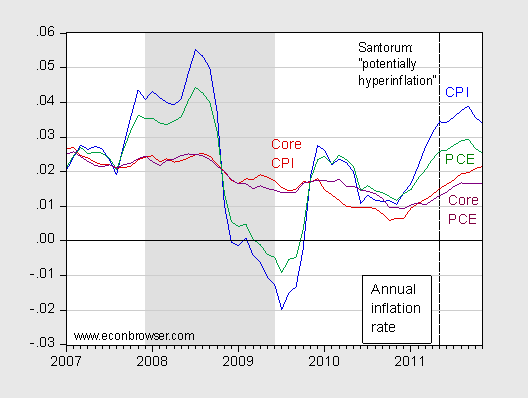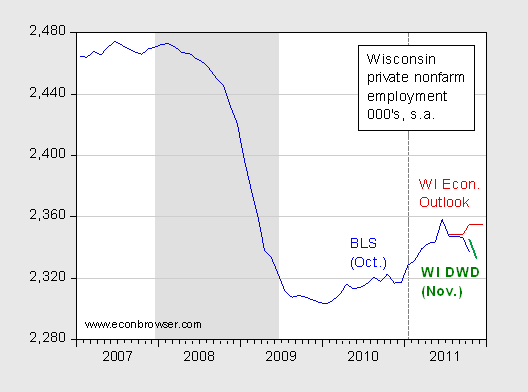Since the media are full of “year in review” pieces, I thought I’d make a contribution of my own. One of the best things about being a blogger is being able to comment quickly on the most outrageous, nonsensical assertions presented in the guise of analysis. Here are my “ten best” (actually — most hilariously deluded) excursions into the fantasy world from my postings to Econbrowser. The inspirations range from Speaker Boehner’s math to the Heritage Foundation’s simulations (where have you gone, Bill Beach!)
February 10. Representative Ryan fears a commodity price explosion. It hasn’t materialized as of the end of the year.

Figure 1: Nonenergy commodity price index (blue) and petroleum price index (dark red), 2005=100. NBER defined recession dates shaded gray. Sources: IMF, International Financial Statistics.
February 17. Speaker Boehner overestimates government employment growth by 37.9%.
April 8, and April 14 (a two-fer!). Heritage cites amazingly high supply elasticities that are seemingly pulled from the air.
May 17. The JEC (Republicans) assert weak dollar causes high gasoline prices.
May 19. Ron Paul and Rick Santorum fear deficit driven inflation.

Figure 2: CPI inflation (blue) Core CPI inflation (dark red), personal consumption deflator inflation (green), and core personal consumption deflator inflation (purple). NBER defined recession dates shaded gray. Sources: BLS and BEA via , St. Louis Fed FRED.
July 21. Dividing by zero and other math tricks.
October 1. The JEC (Republicans) expansionary fiscal contraction scenario assessed.
November 12. The Phoenix Center “estimates” fiscal multipliers.
December 16. Walker Administration: “Things are … moving in the right direction” in Wisconsin.

Figure 3: Wisconsin private nonfarm payroll employment from BLS (blue), from DWD (green bold), and projections from Wisconsin Economic Outlook, in 000’s. NBER defined recession dates shaded gray. Vertical line at 2011M01. Sources: BLS, , October Wisconsin Economic Outlook and NBER.
December 19. The Phoenix Center links the regulatory burden and slow growth.
In my opinion, average annual crude oil prices provide a much better indication of fundamental supply & demand factors. Here is a link to EIA data showing annual Brent prices, which is a good indicator of global crude oil prices:
http://www.eia.gov/dnav/pet/hist/LeafHandler.ashx?n=PET&s=RBRTE&f=A
Here are the annual Brent crude oil prices from 2005 on, along with the rates of change relative to 2005:
2005: $55,
2006: $65, +17%/year
2007: $72, +13%/year
2008: $97, +19%/year
2009: $62, + 3%/year
2010: $80, + 8%/year
2011: $111*, +12%/year
*Estimated
The 2011 annual Brent price is about twice the 2005 annual price, and it is the highest annual crude oil price ever, up 26% over the 2010 price. In my opinion this is a result of importers bidding for a declining supply of Global Net Exports of oil, with developing regions like Chindia currently winning the bidding war.
Another favorite was the piece by the former Bush aide who says CBO projections prove Obama caused the deficit. He omits a) the projections he conveniently chose were made before the recession hit and b) they assume a rise in tax rates – expiration of the GWBush tax cuts – that didn’t happen under Obama. It’s the best of both worlds: ignore reality and condemn the other guy for doing what you demand and keeping tax cuts in place.
This guy’s argument is a form of what I call “monkey pointing”; it consists of pointing at something and going “ooh! ooh! ooh!”
I’m taking this blog off my RSS feed. The only interesting economics on here recently has been by other people, and I can get political snark anywhere.
ecurb: Sorry to lose you. But I don’t expect that anybody who writes: “When people use facts to further their political agendas, you can’t honestly expect the people who oppose them to accept those facts, can you?” to be open to the idea that reciting facts is important in debate. By the way, is there anything factually wrong in what I have written? I take it you just don’t like people being called on their incorrect analysis.
Gold – $1,559 a troy ounce. A certain economist should be tarred and feathered for ‘fantastical pseudo economics’ used to justify a gold bubble.
Menzie,
You missed this gem by Prof. Stiglitz.
http://www.youtube.com/watch?v=E4MAifsp-8E
And why didn’t Obama’s assertion that productivity causes job losses make this list? Certainty that is more fantastical than the state of Wisconsin trying to find something positive to say in the midst of 7 percent unemployment.
In contrast to your headline “Ron Paul and Rick Santorum fear deficit driven inflation”, you site no article where Ron Paul says hyperinflation is eminent. Nor am I aware of him saying that.
Serious inflating is the path of least resistance to deal with debt/unfunded liability that cannot be paid, but the process is only in the 2nd inning. I suspect this is Paul’s view as well.
Jeff: I don’t know the item you’re referencing, but I agree that proposition would only show up in crazy places like the AER, by John Fernald (VP, SF Fed), Susanto Basu (Boston College) and Miles Kimball (U.Mich).
You should read more widely…
Bryce: See here. Put “Ron Paul” and “hyperinflation” in google.news and you’ll get many, many, many more examples.
This is a terrific blog. Thank you. And, sorry about your readers.
Favorite line in a movie. JFK. “Theoretical physics can prove an elephant can hang from a cliff with his tail tied to a daisy. But use your eyes, your common sense.”
My offer still stands, Happy New Year. Menzie!
Steve: Nothing particularly theoretical in the graphs; I’d say they are as empirical as you can get.
A happy new year to you as well, Steve!
Note that we have had two Brent annual crude oil price doublings since 2002–from $25 in 2002 to $55 in 2005, and then from $55 in 2005 to $111 in 2011.
In response to the first price doubling, we did of course see a substantial increase across the board in total liquids production (inclusive of biofuels), in total petroleum liquids, in crude + condensate, and in Global Net Exports (GNE) and in Available Net Exports (ANE).
In response to the second price doubling, we have seen a very slow rate of increase in total liquids production (up 0.5%/year from 2005 to 2010), virtually flat total petroleum liquids and and virtually flat C+C production (through 2010), and a 1.3%/year and 2.8%/year respective decline rate in GNE & ANE (through 2010). I estimate that the ANE decline rate will accelerate to between 5%/year and 8%/year from 2010 to 2020.
I estimate that the current CANE* depletion rate could be on the order of about 8%/year. This would be the rate that we are consuming the cumulative post-2005 supply of global net oil exports available to importers other than China & India.
*Cumulative Available Net Exports (post-2005)
And here are the observed rates of change for key liquids measurements for 2002 to 2005 and for 2005 to 2010 respectively (respectively corresponding to first Brent crude price doubling and to most of second doubling):
Total Liquids (EIA, Including Biofuels): +3.1%/year, +0.5%/year
Total Petroleum Liquids (BP): +2.9%/year, +0.15%/year
Crude + Condensate (EIA): +3.1%/year, +0.08%/year
GNE (BP + Minor EIA data, top 33 net oil exporters): +5.2%/year, -1.3%/year
ANE (GNE less Chindia’s combined net oil imports): +4.2%/year, -2.8%/year
Menzie: So lets get this straight. Are you defending the proposition that the currently high unemployment rate is due to an increase in worker productivity?
Menzie,
In the article you site in reply: ‘Paul said, “I think the wave of the future is inflation. It’s just beginning…”‘
That’s rather different than saying “we are on the brink.” 3.6% inflation isn’t nothing & he’s noting that. Remember a politician is forced into a little more dramatic language than an academic.
Anyway, if he is right a few years down the road, I hope you’ll be a gentleman & give him credit.
Some people still take warnings of doom and other predictions by Right-Wing politicians and candidates seriously? SERIOUSLY? But, THEY NEVER COME TRUE!
Jeff: No; as I said, I didn’t know what Obama comment you were referring to (and you didn’t provide one). All I’m saying is that the proposition that accelerated productivity can result in decreased input use is not prima facie nonsensical. Whether it is empirically verifiable is another question. Since you have done empirical work, I welcome your suggestions.
Thanks again to Jim and Menzie for their tireless efforts this past year to help us understand the world a bit better.
Happy New Year to you, and to the readers and commenters at Econbrowser!
Menzie says: “the proposition that accelerated productivity can result in decreased input use is not prima facie nonsensical”
And yet I don’t recall you ever mentioning this point next to any of your non-farm payroll plots. Which leads me to believe you do not take this position very seriously. Which leads me to believe you are just searching for a way to rationalize Obama’s view. I suppose the alternative is to look at plot of WI non-farm payroll above and say hurray for productivity, things are looking up.
The comment, by the way, was from Suskin’s Confidence Men…you should read more widely.
Jeff: Huh? See this post. Well, you read Suskind, I’ll read AER.
What you did in that post–and what you correctly stated back then–was nothing more than an accounting exercise. Are you strengthening that position now? Are you claiming a causal link?
Many thanks to both Professor M. Chinn and Professor J.Hamilton for your documented analysis,when knowing frequencies and quality of your posts are demanding requirements.
Best wishes to you and readers
Interesting analysis. I appreciate the inquisitive mindset and the ability to uncover discrepancies.
I think it is obvious to anyone that their is an agenda and a slant by the writer, but to each their own.
Overall I agree with much provided, because as mentioned numbers and facts don’t lie.
I only take minor offense to the Ron Paul stuff, but the crique presented is warranted. Regardless, Ron Paul is the most honest and consistent politician, which in my mind, contrasted to Obama is saying quiet a bit. That is why I appreciate the critique but feel it stems more from an agenda setting perspective more than anything, since RP is nothing close to corrupt when compared to any other congressmen, and I take offense to someone taking a shot at someone with REAL integrity. But none the less I welcome healthy debate.
I would enjoy the writers view on how he see’s the US handling owing 1/3 of global debt without their being a dollar crisis. Or just in general your view on the result of the tremendous amour of debt.
Thank you Prof. Hamilton and Chinn and all the contributors on Econbrowser for your insights.
Wish you all a safe, joyous and fulfilling 2012
From Jeff earlier.
“And why didn’t Obama’s assertion that productivity causes job losses make this list?”
Don’t know your citation, but when 10 people can produce what 100 produced before, and the 90 cannot find replacement jobs, then yes productivity enhancements can raise unemployment.
In fact, flip it around. What if someone hired 100 people at lower wages to produce what 10 people at higher wages could produce with better technology? Less productivity and more employment.
What if a country attracted high productivity manufacturing and paid the 10 people subsistance wages (because it can) and then exported the product? More unemployment somewhere.
Menzie,
I don’t mind people calling out mistakes and outright lies, as long as they do it professionally and politely. Your Keystone XL coverage is a good example.
But when someone starts talking about their opponents’ “hilariously deluded excursions into the fantasy world”, I stop trusting that their analysis is any less biased. As I lack the time or math skills to double-check your assertions, this makes reading your blog pointless.
ecurb: (1) I never wrote about Keystone XL. You have me confused with Jim.
(2) If you can characterize any of those items as less than “hilariously deluded”, please get back to me.
P.S. Didn’t you write on 12/29 you were taking this blog off your RSS feed? Why are you still reading?